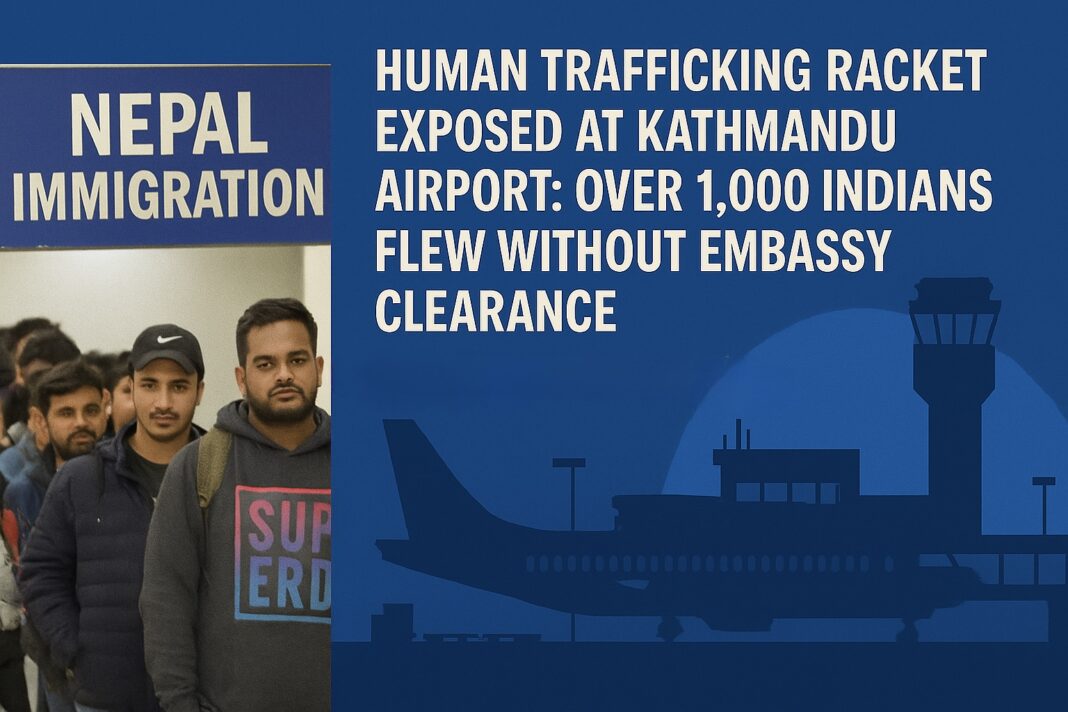- Over 1,000 Indian nationals suspected of illegal activity departed Nepal without No Objection Certificates (NOCs).
- Nepal’s former immigration chief Tirtharaj Bhattarai accused of enabling the bypass through a bribery network.
- Investigation reveals links to fugitives and blacklisted individuals tied to smuggling and extremist activity.
- The Indian Embassy is now coordinating with Nepal’s anti-corruption body on the probe.
- Massive sums allegedly exchanged in exchange for unauthorized exit approvals from Tribhuvan Airport.
Kathmandu, Nepal — A sweeping investigation by Nepal’s Commission for the Investigation of Abuse of Authority (CIAA) has uncovered a disturbing pattern of unauthorized foreign travel through Kathmandu’s Tribhuvan International Airport, where more than 1,000 Indian citizens—including fugitives and blacklisted individuals—were reportedly trafficked to third countries without mandatory Indian Embassy clearance.
According to the news agency Naya Patrika, these unauthorized departures were facilitated through a bribery and collusion network within Nepal’s immigration office. The report states that several individuals facing criminal charges in India were among those allowed to fly abroad from Nepal without valid No Objection Certificates (NOCs).
Under Indian regulations, any Indian citizen seeking to fly abroad via Nepal must obtain an NOC from the Indian Embassy in Kathmandu. But investigators found that from late 2024 to mid-2025, this requirement was ignored for hundreds of individuals, many of them flagged by Indian intelligence services.
Systematic Breach of Protocol
The news agency claims that immigration officials cleared approximately 1,000 Indian nationals in six months without the legally required NOCs—some of whom were on India’s most-wanted list or linked to gold smuggling and extremist activities.
In one confirmed case cited by Naya Patrika, two Indian nationals blacklisted for gold smuggling were allowed to travel abroad despite active alerts. These instances raise questions about institutional integrity at one of Nepal’s highest-risk national security points.
Undercover Operation and Evidence Seizure
The CIAA reportedly conducted an undercover operation after receiving complaints of growing institutionalized bribe collection. On May 20 (Jestha 7), former Immigration Chief Tirtharaj Bhattarai and several close associates were detained. Three mobile phones and one laptop were seized during the raid, and the devices are now under forensic review.
The outlet further reported that Bhattarai allegedly oversaw a daily collection of approximately NPR 5 million (about $37,500) in bribes from travelers, with much of the illegal traffic routed through so-called “visit visas” and third-country transit to destinations like Canada.
Embassy and Government Response
The Indian Embassy in Kathmandu is reportedly alarmed by the discovery. Embassy officials have begun matching internal NOC records with departure lists from Nepal’s Department of Immigration. Many cases of illegal departures had not been reported to the Embassy, which is now actively coordinating with the CIAA, according to outlet.
While the Embassy sends verified NOC lists to the immigration office daily to prevent forgeries, the report notes that corrupt officers at Tribhuvan Airport allowed travelers to board international flights regardless—often in exchange for large sums of cash.
Political Links and Institutional Complicity
The news agency also alleges political protection for Bhattarai and others. He was appointed in October 2024 by then-Home Minister Ramesh Lekhak, despite controversy surrounding his previous roles. According to Naya Patrika, staff transfers within immigration have since been handled exclusively by the Home Minister’s secretariat, raising questions about deeper systemic involvement.
The CIAA reportedly faced resistance from the Ministry of Home Affairs when initially requesting cooperation. Investigators suggest this may indicate internal efforts to shield those involved in the racket.
Some of those trafficked under the guise of tourism have allegedly ended up in exploitative labor conditions or coerced into illegal activity abroad. Human rights groups are now advocating for their rescue and safe return.
Wider Implications
This incident has exposed not just a breakdown in immigration enforcement, but also a coordinated institutional operation spanning Nepal’s Home Ministry, Department of Immigration, and security services. The CIAA is now working with foreign governments, including India, to trace individuals who bypassed legal channels via Nepal.
Further arrests and departmental reshuffles are expected as the investigation expands beyond Kathmandu Airport into potential embassy-level corruption and international trafficking networks.
With inputs from Naya Patrika
A global media for the latest news, entertainment, music fashion, and more.














